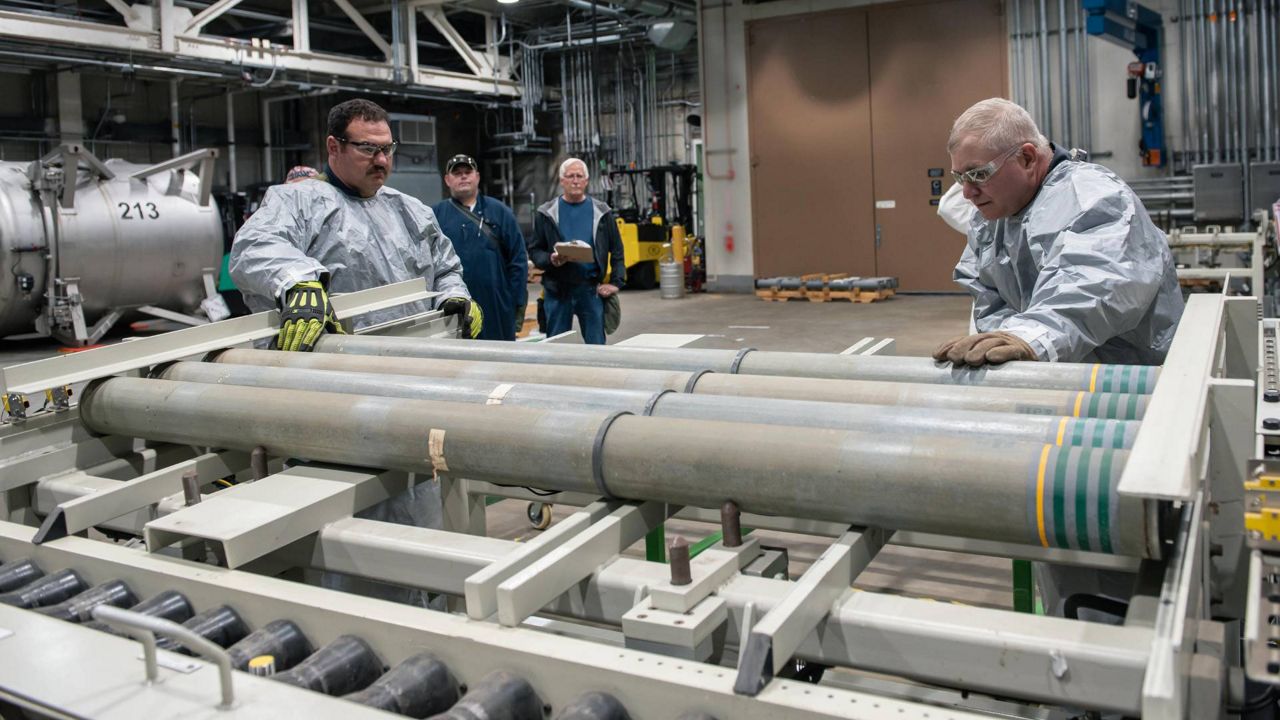RICHMOND, Ky. — The first M55 rockets containing VX nerve agent were destroyed at the Blue Grass Chemical Agent-Destruction Pilot Plant (BGCAPP) July 9, marking the fourth of five chemical weapons destruction campaigns to start at the Blue Grass Army Depot (BGAD).
What You Need To Know
- The first M55 rockets containing VX nerve agent were destroyed at the Blue Grass Chemical Agent-Destruction Pilot Plant
- Destruction began July 9
- This marks the fourth of five chemical weapons destruction campaigns to start at the Blue Grass Army Depot
- Automated equipment will disassemble almost 18,000 rockets
“Rockets are the most complex munitions in our stockpile,” said BGCAPP Site Project Manager Dr. Candace Coyle. “We are eager to see this portion of the chemical weapons in Kentucky destroyed. The team is focused and ready to accomplish the mission safely.”
“Our team has successfully completed two projectile campaigns involving nerve agent,” said Ron Hink, Bechtel Parsons Blue Grass (BPBG) project manager. Hink said safety remains the top priority.
Automated equipment will disassemble almost 18,000 rockets and drain the chemical agent under the observation of trained operators, according to a release from BGCAPP. The agent will be neutralized by mixing it with water and caustic to produce hydrolysate, and when the agent is confirmed destroyed, the hydrolysate will be pumped to holding tanks and processed later at an off-site disposal facility. BGCAPP said the drained rocket warheads will be containerized and destroyed in a Static Detonation Chamber unit located on the depot. Rocket motors will travel to Anniston, Alabama, to be destroyed in a Static Detonation Chamber unit.
The release said BGCAPP's team will work closely with BGAD and Blue Grass Chemical Activity (BGCA) to destroy the chemical weapons.
“The professionalism, leadership and day-to-day level of teamwork between Team BGAD continues to demonstrate a superior level of capability and expertise between all parties,” said BGAD Commander Col. Stephen Dorris. “I couldn’t be prouder of the focused intensity going into the effort to quickly and safely rid Madison County, the Commonwealth of Kentucky, the United States and the people of planet earth, from the threat of chemical weapons.”
The Program Executive Office, Assembled Chemical Weapons Alternatives is responsible for destroying the remaining U.S. chemical weapons stockpile in Colorado and Kentucky. It oversees the contract for design, construction, systemization, operation and closure of BGCAPP with BPBG and subcontractors Amentum, Battelle Memorial Institute and GP Strategies.
“The start of VX rocket destruction is a big step forward for BGCAPP,” said Doug Hindman, Kentucky Chemical Demilitarization Citizens’ Advisory Commission chair. “Their successful destruction of projectiles should give workers the experience to tackle the more dangerous rockets.”
Originally, the depot's chemical weapons stockpile consisted of 523 tons of chemical agent configured in 155mm projectiles containing mustard and VX nerve agent, 8-inch projectiles containing GB nerve agent and M55 rockets containing GB and VX nerve agent.
The BGCAPP team began destroying the mustard stockpile in June 2019 by using the Static Detonation Chamber, and the mustard campaign is more than 90% complete. Nearly 4,000 8-inch projectiles containing GB nerve agent were destroyed at BGCAPP from January through May 2020. The next year, from January through May 2021, almost 13,000 155mm projectiles containing VX nerve agent were destroyed at BGCAPP.
BGCAPP said that as of July 2, more than 28% of the original 523 tons of chemical agent have been destroyed in Kentucky.
Stockpiles in Colorado and Kentucky make up the last 10% of what was originally a national stockpile of more than 30,000 tons of chemical weapons. The U.S. Army Chemical Materials Activity destroyed the first 90%, which was stored at seven other sites across the U.S. and on Johnston Atoll in the Pacific.
Both Colorado and Kentucky are on target to complete the destruction of their chemical weapons by Dec. 31, 2023.



